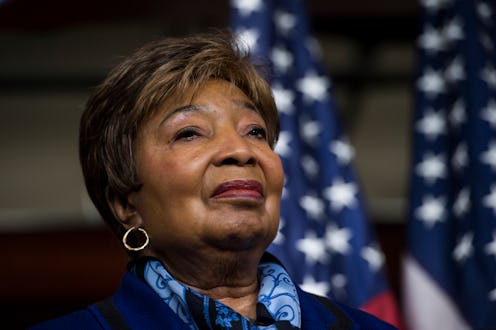News
A Texas Congresswoman Says It's "The Woman's Responsibility" To Prevent Sexual Assault

Following the sexual assault allegations made against Harvey Weinstein, Texas Rep. Eddie Bernice Johnson was angry. Weinstein supported and donated to many Democrats over the years, and Johnson, a Democrat who represents Texas' 30th Congressional District, told a local news outlet that she was disappointed in him. However, despite denouncing Weinstein's actions, Johnson argued that men aren't the only ones responsible for sexual assault and harassment — that women are partly responsible for preventing it.
In an interview with NBC 5, Johnson said:
I grew up in a time when it was as much the woman's responsibility as it was a man's — how you were dressed, what your behavior was. I'm from the old school that you can have behaviors that appear to be inviting. It can be interpreted as such. That's the responsibility, I think, of the female. I think that males have a responsibility to be professional themselves. ... I think we also need to start talking about the power that women have to control the situation. There's law enforcement, you can refuse to cooperate with that kind of behavior. I think that many times, men get away with this because they are allowed to get away with it by the women.
Here, Johnson seems to echo the man she is criticizing, though she argued that she was trying to empower women. After the allegations against him came to light, Weinstein, who denied all sexual misconduct claims against him, issued a statement to The New York Times in which he blames his actions on the "culture" of earlier decades.
“I came of age in the ’60s and ’70s, when all the rules about behavior and workplaces were different,” Weinstein stated. “That was the culture then.”
Following the criticism she received for her comments, Johnson issued a statement to Bustle saying she "will never condone" such behavior, and that she supported victims coming forward.
"Sexual assault and harassment has no place in our society. This is something I believe deeply," Johnson says. "And at each turn of my professional life, I have made it my mission to fight for women’s rights. I do not blame the victims of sexual assault for the actions of their assailants. I do acknowledge that my comments regarding behavior and attire come from an old school perspective that has shaped how some of us understand the issue, but that does not detract from the fact that criminals need to be held accountable for their actions. ... I will always encourage victims to come forward so that we can hold these criminals accountable."
In her statement, Johnson also thanked those who have come forward in the Weinstein story for starting a "public dialogue" about this systemic issue. She subsequently called for unequivocal support for survivors as well as for more accountability for perpetrators. "Supporting all women in this fight will continue to be my life’s work," Johnson concluded.
In response to Johnson's initial comments, Jodi Omear — the vice president of communications at RAINN (Rape, Abuse & Incest National Network) — tells Bustle in a statement that "sexual assault is never the victim's fault."
"Public opinion has evolved over the years and it's important that we believe and support survivors," Omear says. "This isn't a partisan issue. We all have a role to play in ending sexual assault."
As The Washington Post pointed out, Johnson's comments seemed to be out of character. For decades, Johnson, 81, has been outspoken about the issues facing women. Back in 1990, she spoke to the Chicago Tribune about women's liberation.
“Being a woman and being black is perhaps a double handicap,” she said at the time. “When you see who's in the important huddles, who's making the important decisions, it's men.”
Johnson was the first nurse elected to Congress, and last year she hosted “A World of Women for World Peace” conference in her Texas district to address the issues faced by girls and women all over the world, including sexual assault. But as Johnson herself acknowledged in her statement to Bustle, the criticism has shown that her track record on women's issues does not excuse her comments.
Johnson also made these remarks as people all over the world used the #MeToo hashtag to share their personal experiences with harassment and sexual assault. Actress Alyssa Milano made the #MeToo campaign go viral on Twitter over the weekend, but Tarana Burke — an activist who has been working with survivors of sexual assault for over a decade — first launched the "Me Too" movement to help and empower girls and young women of color who had survived abuse and sexual assault. Johnson's suggestion that women must play a role in preventing assault therefore invalidates all of the survivors who have come forward to share their stories.
It is also important to note how pervasive sexual assault is. According to a recent poll from ABC News and The Washington Post, roughly 54 percent of the women polled reported experiencing unwanted sexual advances from men, and 30 percent reported have this experience at work. Of this latter group, 95 percent said that male harassers received no punishment.
What this illustrates is that sexual assault and harassment impact people from all walks of life — in different industries, at different locations, and in different circumstances. "Survivors," Omear tells Bustle, "should never be blamed for the actions of the perpetrator."